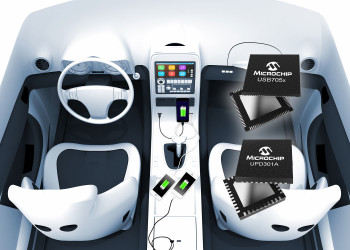Two USB-PD solutions simplify Power Delivery (PD) in growing USB Type-C™ charging market
August 29, 2019
on
on
|
Key Facts:
|
Microchip announces two new solutions that simplify USB Type-C PD designs to remove the traditional complexity and high costs associated with implementing USB Type-C in a range of applications.
 As one of the industry’s first USB-IF-certified USB 3.1 SmartHub devices with integrated support for Power Delivery (TID1212), the USB705x family enables fast device charging and introduces unique PD implementations called HostFlexing and PDBalancing. The UPD301A is a standalone USB Type-C PD controller that significantly simplifies the implementation of basic USB Type-C PD charging functionality, making it ideal for applications from rear seat charging in vehicles to portable equipment to public charging stations.
As one of the industry’s first USB-IF-certified USB 3.1 SmartHub devices with integrated support for Power Delivery (TID1212), the USB705x family enables fast device charging and introduces unique PD implementations called HostFlexing and PDBalancing. The UPD301A is a standalone USB Type-C PD controller that significantly simplifies the implementation of basic USB Type-C PD charging functionality, making it ideal for applications from rear seat charging in vehicles to portable equipment to public charging stations.The USB705x family includes two unique features that simplify USB Type-C PD implementations: HostFlexing and PDBalancing. HostFlexing simplifies the user’s docking station experience by allowing all USB Type-C ports to function as the “notebook” port, eliminating the need for cryptic labels that try and explain overall functionality of each USB Type-C port. PDBalancing provides a methodology for manufacturers to manage overall system power through centralised control, ultimately saving money for consumers by being able to charge a number of PD enabled devices with less overall power.
To meet consumer demand for faster mobile device charging and data streaming, the USB705x family combines native support for USB Type-C PD with the 5 Gbps SuperSpeed data rates of USB 3.1. Ideal for docks, PC monitors and automotive infotainment, the family, which consists of the USB7050, USB7051, USB7052 and USB7056, provides a range of USB configurations to meet varying PD and USB Type-C design needs. For example, the USB7050 supports three PD-enabled upstream and downstream USB Type-C ports, while the USB7056 provides only one upstream port alongside five traditional Type-A downstream ports.
Read full article
Hide full article


Discussion (0 comments)